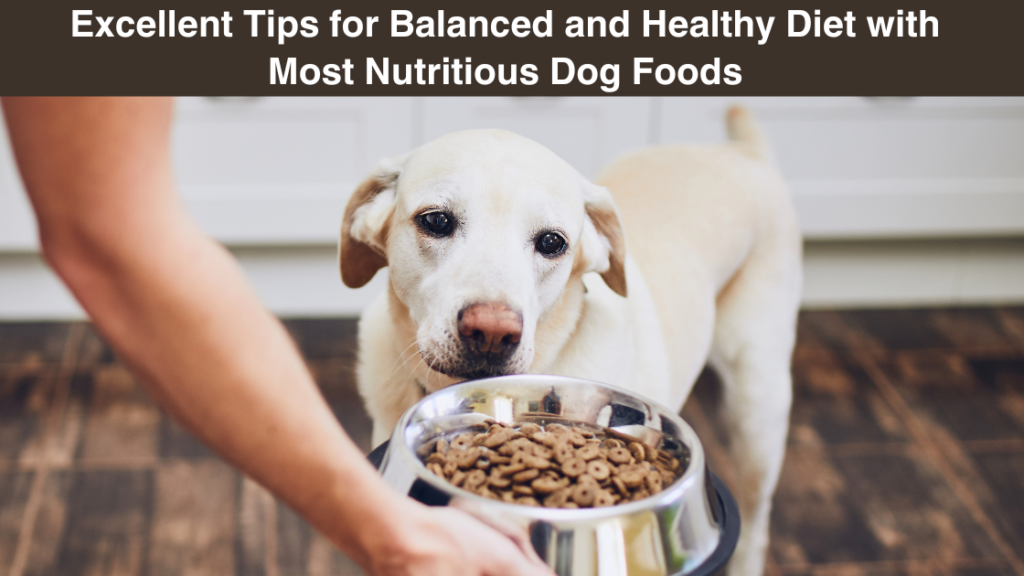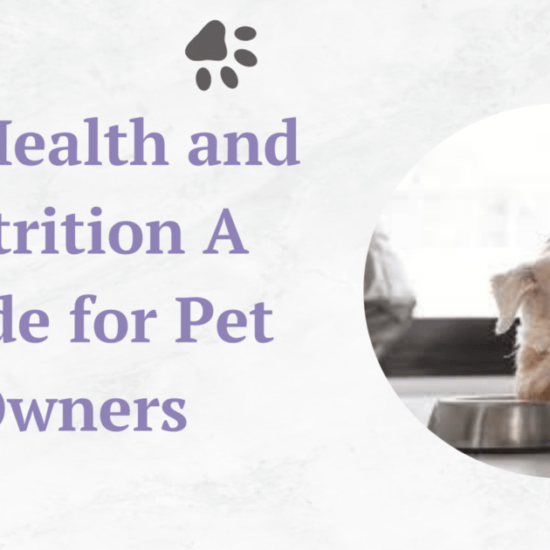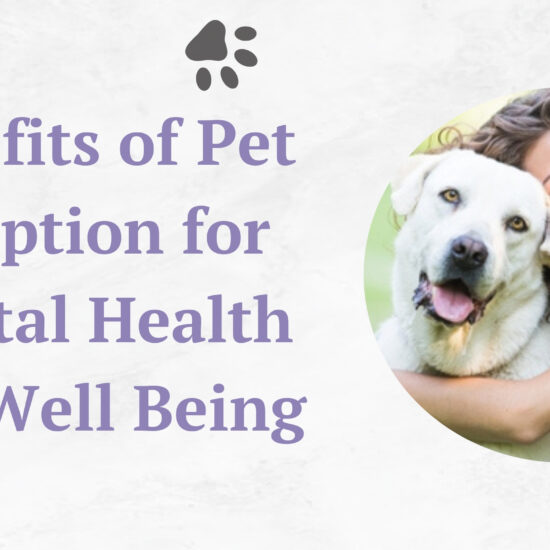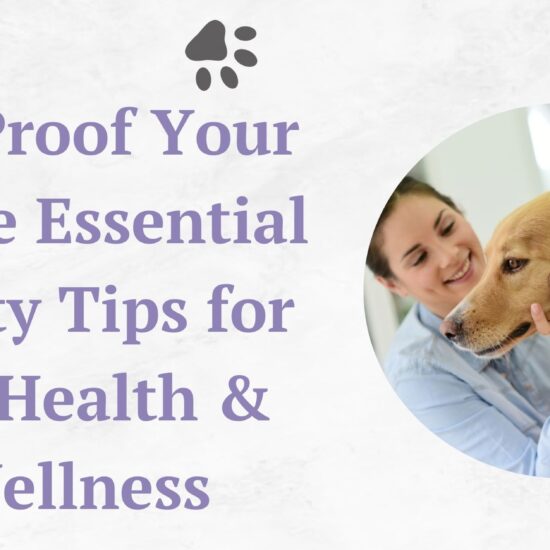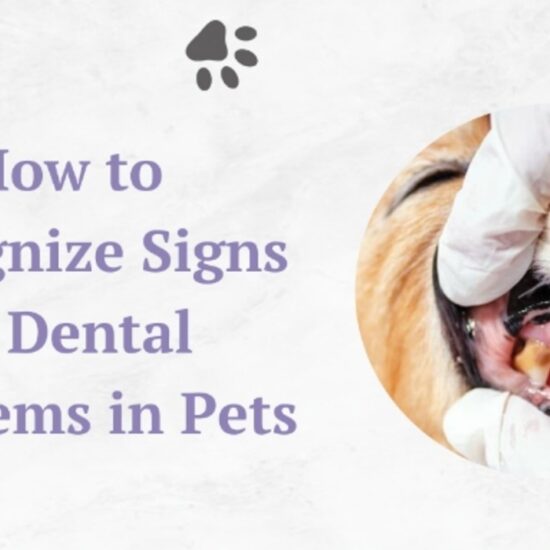Dogs are an important part of our lives because they provide companionship, love, and loyalty. It is our obligation to ensure that pets live healthy and fulfilling lives. Nutrition is one of the most important parts of dog care. A well-balanced and healthy diet comprising the best nutritional dog food is critical to your pet’s general health, longevity, and quality of life.
Table of Contents
Introduction
This article will discuss the significance of dog nutrition, the nutritional requirements of various sorts of dogs, and vital advice for ensuring your cherished furry friend gets the finest diet possible.
Importance of Best Nutritional Dog Food

Proper nutrition is the foundation of a dog’s health, and it is as important in their life as it is in ours. Our cherished animal friends rely on us to supply them with a nutritious diet, and here’s why dog nutrition is critical:
Overall Health: Nutrition is the building block for a dog’s overall health and well-being. It is the fuel that powers their bodies and has an impact on every area of their lives. The food they eat directly affects their energy levels, which in turn determines how active and vivacious they are. A well-nourished dog will exude vigor, demonstrating a zest for life that will delight both their owners and themselves.
Furthermore, high nutrition dog food is crucial to boosting their immune system, the body’s natural defense mechanism. A well-fed dog has a strong immune system, making them better able to fight off illnesses and infections. From the heart to the liver, their organs rely on nutrients from their diet to work properly. Even their fur or feather condition reflects their nutritional level; a balanced diet adds to a bright, lustrous coat.

Disease Prevention: A well-balanced diet with the most nutritious dog foods functions as a barrier, protecting dogs from a variety of potential health conditions. Obesity, for example, is a prevalent issue in dogs that can lead to a series of health issues. A well-balanced diet combined with portion management can help to avoid the development of obesity, lowering the risk of diabetes, joint problems, and cardiovascular diseases.
Also, oral health is deeply related to nutrition. A high nutrition dog food that promotes oral health, such as dental-specific issues or kibble tailored to reduce plaque buildup, can dramatically lower the risk of dental disorders like periodontal disease.
Furthermore, certain disorders, such as kidney disease, can be handled with high nutrition dog food that reduces the strain on the kidneys, allowing dogs to live a better life. Dog owners can take proactive actions in disease prevention by providing the proper nutrients and controlling their diet.

Healthy Growth: The importance of diet for puppies and kittens cannot be overemphasized. The first few years of life are crucial for growth and development. The proper dietary balance guarantees that they reach their greatest potential in terms of size, strength, and overall health. Nutritional deficits during this critical era might result in stunted growth and developmental problems that can last into adulthood.

Mental Well-being: Nutrition has a significant impact on a dog’s mental well-being in addition to physical health. A healthy dog is more active, attentive, and fun. They are usually in a better mood, with a wonderful passion for life. A diet deficient in critical nutrients might cause fatigue, irritation, and even behavioral issues. Inadequate nutrition can make dogs ill and unhappy, lowering their quality of life.
Longevity: An adequate diet comprising the best nutritional dog food plays an important role in determining a dog’s lifespan and quality of life as they age. Dogs who are fed a well-balanced and nutritious diet are more likely to enjoy longer and happier lives. A healthy diet can help avoid or postpone the start of age-related illnesses, ensuring that our canine companions enjoy their golden years with vitality and enthusiasm.
Understanding Dog Nutrition

Understanding your pets’ nutritional needs is critical to providing them with the most nutritious dog foods. Similar to how different types of humans have unique dietary requirements, different types of pets, such as dogs and cats, have unique nutritional needs that depend on factors like age, breed, size, and activity level. Let’s look more closely at the nutritional requirements of typical dogs.
Dogs, who are omnivores, eat a diverse diet that includes both animal and plant-based items. Consider the following nutritional requirements to guarantee their best health:
Protein: High-quality protein sources such as meat, chicken, and fish are essential for dogs. Protein is essential for muscle growth, repair, and overall body upkeep. It contains the essential amino acids required for a variety of biological activities.
Fats: Fats provide dogs with a concentrated source of energy. They are necessary for maintaining healthy skin and a lustrous coat. In addition to providing energy, lipids aid in the absorption of fat-soluble vitamins such as A, D, and E.
Carbohydrates: While dogs do not need carbohydrates as a primary source of energy, they can benefit from complex carbohydrates found in whole grains such as rice and oats. These carbs provide a consistent supply of energy and can be included in a well-balanced diet.
Vitamins and Minerals: To support their numerous physiological processes, dogs require a variety of vitamins and minerals. Calcium and phosphorus are required for bone health, while vitamins A, D, and E are important for overall health.
Water: Dogs must be hydrated at all times. They must always have access to clean, fresh water. Water is required for digestion, temperature regulation, and waste disposal from the body.
Fiber: Fiber, which is found mostly in vegetables and some grains, can help with digestion and avoid constipation. It bulks up the food and can help dogs with gastrointestinal issues.
Understanding these individual nutritional needs is the first step toward providing the most nutritious dog food that promotes your dog’s health and well-being. It’s always a good idea to talk to your veterinarian about tailoring your dog’s diet to their exact needs, taking into account things like age, activity level, and any specific health concerns they may have. By doing so, you may ensure that your dogs prosper and live a long and healthy life with you.
Tips for Feeding Your Dog a Balanced and Healthy Diet
One of the most important components of good dog ownership is providing your dog with a balanced and healthy diet comprising the best nutritional dog foods. Here are some practical tips to help you do just that:

Consult Your Veterinarian: It is crucial to consult your veterinarian before making any major dietary modifications for your dog. When it comes to your dog’s nutrition, they are your most dependable source of advice. Veterinarians can make recommendations regarding the most nutritious dog foods that are suitable to your dog’s needs, taking into account aspects such as age, breed, health condition, and activity level. This expert advice guarantees that your dog’s food meets their specific needs.

Select High-Quality Commercial Dog Food: Commercial dog food is designed to suit the nutritional needs of dogs and is available in a variety of forms, such as dry kibble, canned, or frozen. Look for companies that have AAFCO (Association of American Feed Control Officials) accreditation when purchasing dog food. This accreditation guarantees that the product fulfills industry nutrition criteria for complete and balanced nutrition. High-quality commercial dog diets usually mention meat or protein sources as the first component, ensuring that your dog will get the necessary amino acids.

Read Ingredient Labels: Carefully read and comprehend the ingredient list on dog food labels. Ideally, the first ingredient should be a high-quality source of animal protein. Avoid dog foods with a lot of fillers, artificial additives, and preservatives. By carefully reading labels, you may make informed decisions regarding high nutrition dog food that benefits your pet’s overall health.

Portion Control: Portion control is essential for your dog’s health. Follow the feeding instructions listed on the dog food packaging. Overfeeding can lead to obesity, which can lead to a variety of health concerns such as joint pain, diabetes, and a shorter lifespan. If you’re confused about the proper portion size for your dog’s individual needs, see your veterinarian.

Avoid Feeding Table Scraps: Avoid feeding your dog table scraps or human food. Many human meals are unsafe for dogs and can cause stomach problems or poisoning. Chocolate, grapes, onions, garlic, and alcohol are all popular harmful foods for dogs. To protect their safety and well-being, stick to their prescribed dog food. Always feed them the best nutritional dog foods.

Select Age-Appropriate Food: Dogs have diverse nutritional requirements at different stages of life. Puppies and kittens, for example, necessitate diets that promote quick growth and development. Their nutritional requirements fluctuate as they age. Make sure your dog is eating an age-appropriate diet that meets their individual needs. Senior dogs may benefit from diets that are specifically designed to treat age-related concerns such as joint health or decreased metabolism.

Maintain a Bowl of Clean, Fresh Water on Hand: Always maintain a bowl of clean, fresh water on hand for your dog. Hydration is critical for their health since it assists digestion, temperature regulation, and waste disposal. Make a routine of cleaning and refilling their water bowl on a regular basis to keep it appealing and free of impurities.

Monitor Body State: Assessing your dog’s body state on a regular basis is a proactive strategy to determine their health. Without any additional fat covering them, their ribs should be visible. Consult your veterinarian right away if you notice a severe weight gain or loss. They can assist you in adjusting your dog’s food and exercise program as needed to keep them in good health.
Provide Variety: Including different foods in your dog’s diet can help reduce dietary boredom and maintain balanced nutrition. You can, for example, cycle different protein sources within their commercial diet or integrate other fruits and vegetables as rewards on occasion.
Note: There might be affiliate links mentioned here. We may receive a commission if you purchase a product through an affiliate link. There is no additional charge for you. Please do your own research before making any online purchases.
However, don’t introduce new meals too quickly, as this can cause gastric distress. Always do your homework to find out what foods are safe for your unique dog species and breed.

Beware of Homemade Diets: While some dog owners prefer to cook homemade meals for their dogs, it is critical to proceed with caution. Nutritious homemade dog food can be helpful when properly prepared, but it can also be dangerous if not properly balanced. If you plan to make homemade food for your dog, consult a veterinary nutritionist or your veterinarian. They may advise you on how to ensure your dog’s diet fulfills his or her nutritional demands, allowing you to prevent potential shortages or imbalances.
FAQs
What is the significance of dog nutrition?
Dog nutrition is important since it has a direct impact on your dog’s general health, vigor, and lifespan. A well-balanced diet supplies important nutrients, boosts the immune system, protects against diseases, and promotes healthy growth and mental well-being.
Can I feed a vegan or vegetarian diet to my dog or cat?
While a vegan or vegetarian diet can be provided for dogs with adequate planning and supplements, it is not suggested for cats. Cats are obligate carnivores, and their diet should consist mostly of animal protein.
How can I know whether my dog is overweight or underweight?
You may examine your dog’s overall health by feeling their ribcage. Your dog is likely to be at a healthy weight if you can easily feel the ribs without excess fat concealing them. If you are unsure or see major weight fluctuations, consult your veterinarian.
Do grain-free diets benefit dogs?
No, not always. While some dogs may be allergic to grains, grains such as rice and oats can be included in a nutritious diet for many animals. The goal is to prioritize high-quality protein sources and a well-balanced diet.
What should I do if my dog is allergic to or sensitive to certain foods?
Consult your veterinarian if you feel you have dietary allergies or sensitivities. To detect and treat specific dietary triggers, they can propose hypoallergenic or novel protein diets.
Can I provide homemade snacks and meals for my dog?
If prepared appropriately, homemade snacks and meals can be beneficial. They should, however, be balanced, and you should consult a veterinarian or veterinary nutritionist to verify they match your dog’s nutritional needs.
Should I feed my dog wet food or dry kibble?
Both wet and dry food have benefits. Wet food can aid in hydration, while dry kibble can aid in oral health. Your dog’s preferences and unique requirements will determine the best option.
Can I serve the same meal to my dog every day?
While some dogs thrive on a steady diet, varying the food can help reduce dietary boredom and provide a greater spectrum of nutrients. Consider alternating protein sources and varying snacks and vegetables in moderation.
What should I do if my dog or cat refuses to eat?
Consult your veterinarian if your dog routinely refuses to eat. Loss of apdogite might indicate underlying health issues, and your veterinarian can advise you on appropriate dietary changes or therapies.
Can I give my dog nutritional supplements, such as vitamins and minerals?
In general, dogs on balanced commercial food do not require supplements. Supplementing without consistency can result in imbalances or overdosage. Before giving your dog any vitamins, consult with your veterinarian.
Conclusion
Dog nutrition is an important part of proper dog ownership. You can guarantee that your dog obtains a balanced and healthy diet by understanding your dog’s individual dietary requirements and following the advice mentioned in this article. Remember to consult your veterinarian before adjusting your dog’s nutrition to their specific needs. You may help your dog’s overall health, happiness, and longevity by providing correct nourishment and ensuring many happy years together.


